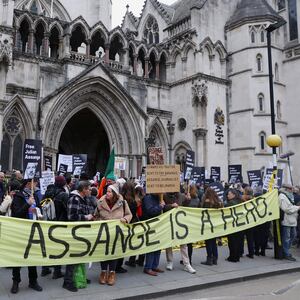WikiLeaks founder Julian Assange was handed a boost in his yearslong legal battle on Tuesday as a British court ruled that he will not be extradited to the U.S. immediately.
London’s High Court judgment found the Australian journalist “has a real prospect of success” in three of his grounds for appeal against a 2022 decision from the U.K. government allowing his extradition to face espionage charges. But before a decision is taken on whether he can launch a full appeal, the court has asked for specific assurances from the U.S. about what could happen to Assange. If the assurances aren’t filed, his leave to appeal will be granted automatically.
“Mr. Assange will not, therefore, be extradited immediately,” the court said. The U.S. government has been given three weeks to make assurances that Assange will be allowed to “rely on the First Amendment” protecting free speech, that he won’t be prejudiced at trial on the grounds of his nationality, that he’ll receive the same First Amendment rights as an American citizen, and that he will not face the death penalty.
If the assurances are received, both parties will be able to make new representations at a hearing on May 20, the court said. A final decision on leave to appeal would be made after that hearing “if the assurances are satisfactory.”
American prosecutors want to put the 52-year-old on trial for charges related to the publication of a tranche of classified U.S. intelligence files in 2010. They say Assange is not being prosecuted for the publication of the secret documents but rather for allegedly helping and conspiring with ex-U.S. Army intelligence analyst Chelsea Manning in illegally obtaining them. (Manning was ultimately sentenced to 35 years in prison, but former President Barack Obama commuted her sentence, after she’d served seven years, during his last days in office in 2017.)
According to prosecutors and Assange’s critics, the leaks put lives at risk. Assange’s supporters, conversely, say he is being unfairly persecuted for exposing American malfeasance; the leaks brought to light information about civilian deaths during the wars in Afghanistan and Iraq, among other revelations.
Assange has been indicted on 17 espionage charges and one count of computer misuse. If convicted, he could potentially face a sentence of up to 175 years in prison, Assange’s lawyers say, though lawyers for the U.S. have previously said he would likely face a much less severe punishment.
Assange’s family say his health has suffered in recent years. Last month, his lawyer said he was unable to attend a two-day hearing at the London court because he was too ill, while his brother told a British TV station that Assange is “going through an immense amount of suffering” behind bars.
Assange was taken to Belmarsh Prison—where he has spent the last five years—following his arrest in April 2019, after Ecuador ended its offer of diplomatic asylum in its London embassy. He’d lived in a cramped office in the embassy for seven years, first entering in 2012 to avoid extradition to Sweden on allegations of rape and sexual misconduct that were eventually dropped. Assange was dragged out of the diplomatic building after his relationship with the Ecuadorian government broke down and he was quickly taken into custody by British police for skipping bail.
Following Tuesday’s ruling, Assange’s wife, Stella Assange, said her husband “remains exposed to the death penalty” and said she was “astounded” that the court chose to delay making a decision on his appeal, according to the BBC. She also alleged that the judgment invited “a political intervention from the U.S.”
If Assange’s fight against extradition ultimately fails in the English judicial system, his lawyers have vowed to apply to the European Court of Human Rights, which could intervene to prevent the U.K. from sending Assange across the Atlantic.







